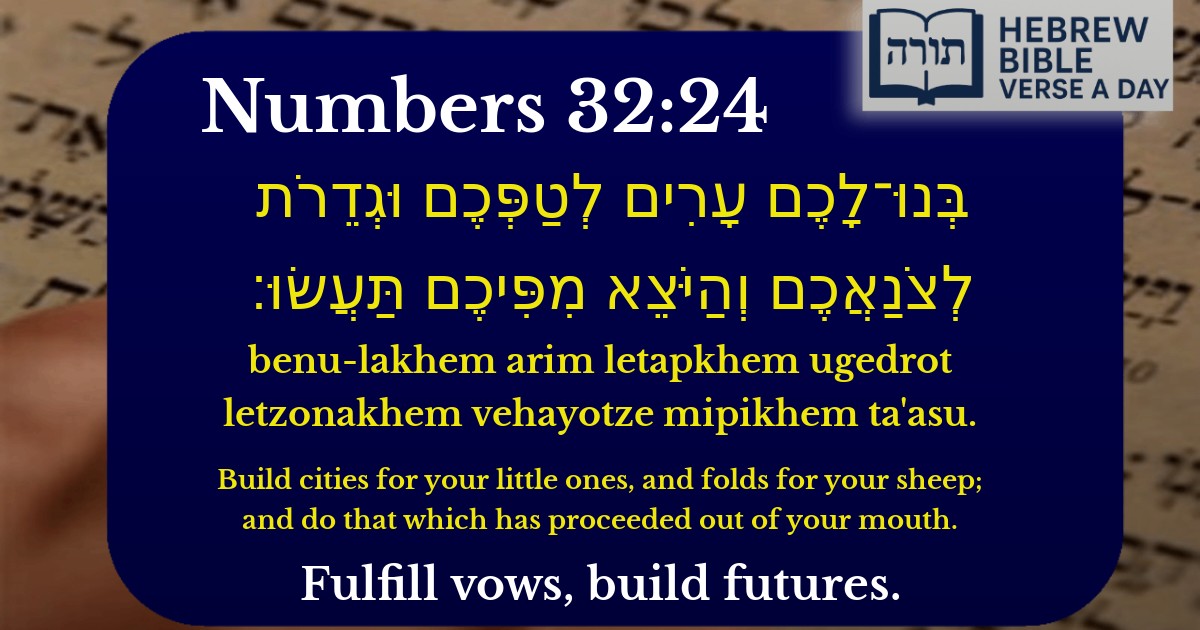Frequently Asked Questions
Q: What does Numbers 32:24 mean when it says 'Build cities for your little ones'?
A: This verse is part of Moshe's (Moses') instruction to the tribes of Reuven and Gad, who requested to settle on the eastern side of the Jordan River. Rashi explains that Moshe emphasized building cities for their children first, before pens for their livestock, to teach that family and community needs take priority over material possessions.
Q: Why does the verse mention both cities for children and folds for sheep?
A: The order is significant. The Talmud (Bava Metzia 83a) learns from this that one must prioritize human needs (cities for children) over property (folds for sheep). Rambam (Hilchos De'os 5:1) also derives ethical lessons about proper priorities in life from this verse.
Q: What does 'do that which has proceeded out of your mouth' mean in Numbers 32:24?
A: Rashi explains this refers to keeping one's word and fulfilling promises. The tribes had promised to help conquer Canaan before settling their own land, and Moshe was reminding them to keep this commitment. This teaches the Jewish value of emes (truth) and keeping one's word.
Q: How can we apply the lesson of Numbers 32:24 today?
A: The Midrash (Bamidbar Rabbah 22:9) teaches this verse shows we must prioritize spiritual and family needs over material concerns. Today, this reminds us to invest in Jewish education and community before luxuries, and to always fulfill our commitments, especially those made to Hashem and others.
Q: Why is this verse important in Jewish tradition?
A: This verse establishes important Jewish values: 1) Prioritizing children's welfare and education (building cities for them first), 2) Being responsible for one's commitments ('do that which has proceeded out of your mouth'), and 3) Proper priorities between people and possessions. These principles are foundational in halacha and Jewish ethics.


Context of the Verse
The verse appears in Bamidbar (Numbers) 32:24, where Moshe responds to the request of the tribes of Reuven and Gad to settle on the eastern side of the Jordan River. They had promised to assist in conquering Eretz Yisrael before settling their families and livestock. Moshe holds them accountable to their word, emphasizing the importance of fulfilling vows.
Literal Interpretation (Peshat)
Rashi explains the verse as a direct instruction from Moshe to the tribes of Reuven and Gad: they must first build cities for their children and enclosures for their livestock—fulfilling their practical needs—before joining the other tribes in battle. The phrase "וְהַיֹּצֵא מִפִּיכֶם תַּעֲשׂוּ" ("do that which has proceeded out of your mouth") underscores their obligation to keep their promise to fight alongside their brethren.
Moral and Ethical Lessons (Derash)
The Talmud (Bava Metzia 44a) derives from this verse the principle that one must fulfill their verbal commitments, as words have binding force. Rambam (Hilchot De'ot 5:13) expands on this, teaching that a person's integrity is measured by their adherence to their spoken word. The Midrash (Tanchuma, Matot 7) further emphasizes that failing to keep a promise is akin to idolatry, as it demonstrates a lack of reverence for truth.
Practical Applications (Halacha)
Kabbalistic Insight (Sod)
The Zohar (Bamidbar 190b) interprets the verse allegorically: "building cities for your little ones" refers to nurturing the "small" or undeveloped aspects of the soul (e.g., good deeds and Torah study), while "folds for your sheep" symbolizes guarding one's spiritual "flock" (mitzvot) from negative influences. The concluding phrase teaches that speech has creative power—words must align with action to manifest holiness.